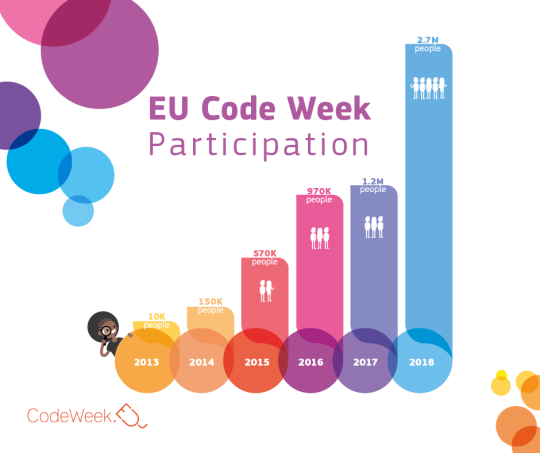EU Code Week 2018 breaks all-time record, with 2.7 million participants and nearly 44,000 events
Publication date: January 31, 2019
Young people from all over Europe are showing a growing appetite for coding activities, robotics and computational thinking, as the record participation in EU Code Week clearly reveals. The number of people taking part has grown from 10,000 to 2.7 million in just six years. The 2019 edition will take place from 5 to 20 October.
In 2018, EU Code Week, supported by the European Commission, achieved a new record with 2.74 million participants, 43,657 events and over 10% of schools in Europe involved, including the Western Balkans countries. The average age of participants was 12 years. Italy was the most active country with over 20,000 activities, followed by Turkey (7,700) and Poland (5,000). In France, 9% of participants were girls or women.

European Commissioner for Digital Economy and Society Mariya Gabriel welcomed the results:
“I am proud that the European Commission is a strong partner of EU Code Week. Only by working with the young generations and giving them enough opportunities to get ready for their future projects, Europe as a whole will succeed in the global digital race. Our goal is to involve at least half of all European schools in the EU Code Week by 2020, and so I encourage even more organisers to get on board and offer coding activities during the EU Code Week 2019.”
Record results in Europe and beyond EU Code Week started in 2013 with events in 26 European countries. Today, this grass-root initiative involves people all over the world. In 2018, activities took place in 72 countries in Europe and around the globe such as Peru, Malaysia or Egypt. The average participation was 63 people per event.
Over 14,000 activity organisers joined the special CodeWeek4All Challenge, whose objective is to encourage cooperation between organisers and across borders. To participate organisers form networks and try to fulfil at least one of these three conditions:
- connect events in a minimum of three countries
- connect at least 10 events
- reach at least 500 participants
In 2018, 26 networks managed to meet all three criteria.
Save the date: EU Code Week 2019
This year, EU Code Week will take place from 5 to 20 October. Organisers can already register their events and pin them on the EU Code Week map. The multi-lingual codeweek.eu website offers a record volume of resources, toolkits, video tutorials and other materials. This helps organisers who do not have a deep knowledge of coding to prepare appealing activities.
The website offers a dedicated section for teachers, including “Learning Bits” – short videos and ready-to-use lesson plans that help teachers use coding and logical thinking activities in their classroom. The Learning Bits, for example, offer practical tips on how to organise coding workshops without digital technology or how to use visual programming software like Scratch. The overall objective is to bring coding also to non-tech subjects such as history, geography or social sciences.
In today’s hyper-connected world, basic digital literacy is a vital competence, especially for kids and young people. They need to understand what is behind the screen of their smartphone, how artificial intelligence might be (mis)used and how social media works. EU Code Week offers an attractive and engaging way of learning how to create simple apps, command a robot or analyse data.
Digitisation is also changing how people work and what skills they need. The demand for ICT specialists is growing and many of today’s pupils and students will work in jobs that do not exist yet. By learning to code they improve computational thinking, learn to solve complex problems and build a solid basis for further education in tech related disciplines.
For more information
EU Code Week – Bringing ideas to life


